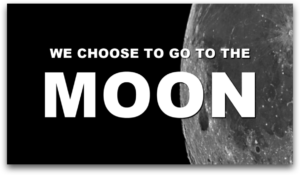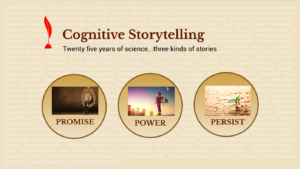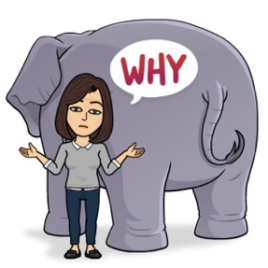
How did the US end up first on the moon, despite falling far behind the USSR in the space race? Because of a story Kennedy told, reminding Americans that we are the kind of people who do hard things. It was his narrative that led us to invest in NASA, and took us to the moon.
Hundreds of research studies prove that the biggest predictor of success is not the facts of your situation, but the story you tell. Just a few examples:
- A Yale study found that people with positive narratives about aging in midlife live seven years longer than people with negative narratives — all other factors aside;
- The design firm IDEO found that the only difference between successful and failed projects was the mindset of the creative teams;
- When told “you are the kind of person who can do this,” people are 33% more likely to be successful at a given task.
In business and in life, our narratives determine our outcomes. That’s why storytelling is so important. But for al the talk about the power of storytelling, but here’s one story that hardly ever gets told:
Most stories don’t work.
The reason for that is simple. Storytelling is a competitive sport, arguably the most competitive sport. We unlock our phones 80-120 times each day. We take in 14 newspapers’ worth of information every day. Eighty percent of all human interaction is some form of storytelling.
As a result, we only retain one out of every 100 pieces of information we receive. Literally, for every one hundred pieces of content that we are exposed to every day, our brain dumps 99 of them into the neurological spam folder. They don’t even break through.
That’s the bad news. Here’s the good news.
There’s a science to storytelling
In recent years, leaders have learned the value of cognitive science in driving business performance. Thousands of pages have been written on behavioral economics, cognitive psychology and neuroscience. But it would take a lifetime to learn all that research, and figure out how to apply it in your unique situation.
That’s where we come in.
We have spent years researching every aspect of cognitive science and studying its application in real world scenarios, from political elections to new product launches, to public health campaigns. We’ve distilled over twenty-five years of cognitive science into a simple narrative structure that is easy to learn and apply.
Twenty five years of science. Three kinds of stories.
Our approach delivers the emotional impact of a good story and the intellectual horsepower of the most cutting edge science. We call it cognitive storytelling.
When clients work with us, we focus on three key areas. First, we help you create a deeper level of emotional engagement with your audience, through promise stories.
Second, we help you fuel performance both internally and externally, with power stories.

The cognitive storytelling model distills twenty-five years of research into three kinds of stories, easy to learn and apply
And third, we help you overcome the inevitable obstacles and build resilience, with setback stories.
Each one of these stories is grounded in literally decades of research. You’ll learn Michael J. Fox’s insight on holes that don’t stay empty, how the behavioral scientist Daniel Kahneman shows the difference between Spock and Homer Simpson, and what the US Army War College has in common with Joseph Campbell.
Better stories. Deeper understanding.
The goal of our work is twofold. First, we help our clients build better stories to get better outcomes. But second, and more deeply, we help our clients understand why stories work and how to build better ones on their own. We offer new tools, new insights and new abilities to help you and your teams perform better in a highly competitive world, long after your work with us is done.
Contact Us Change The Narrative



